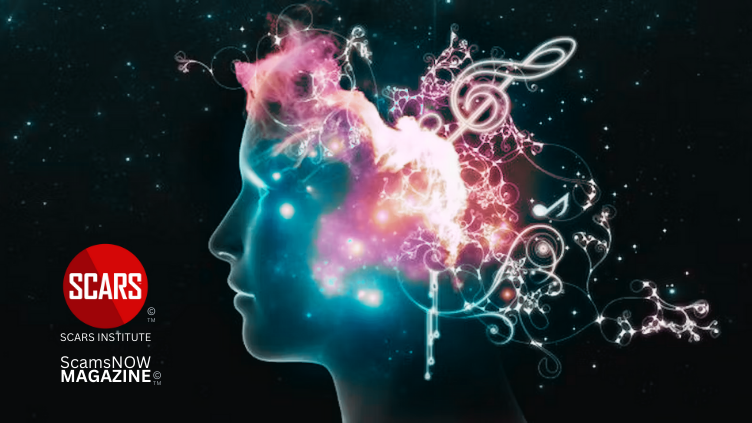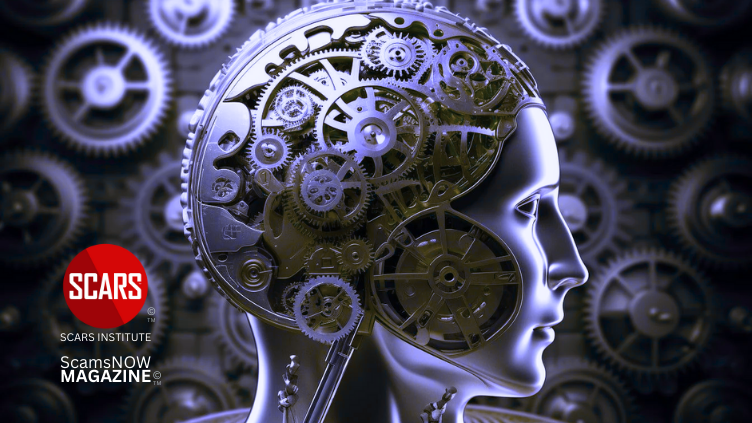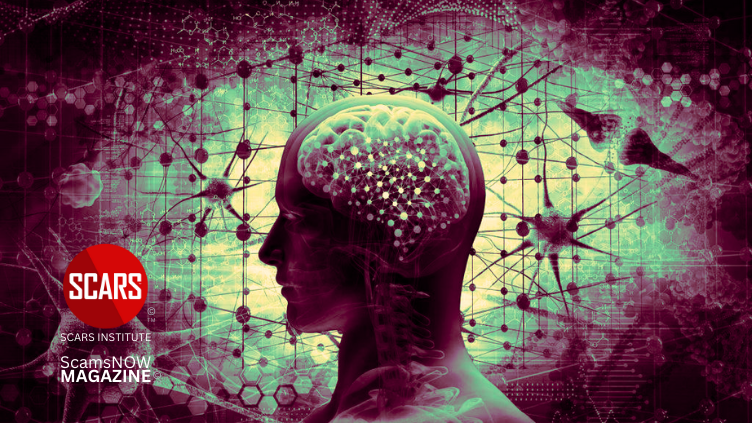The Mind-Brain Bias And How This Deters People From Getting Help When They Need It
The Challenge of Helping Scam Victims When They Cannot Accept What Has Happened to Their Brain from Trauma
Primary Category: Scam Victim Recovery Psychology
Authors:
• Vianey Gonzalez B.Sc(Psych) – Licensed Psychologist, Specialty in Crime Victim Trauma Therapy, Neuropsychologist, Certified Deception Professional, Psychology Advisory Panel & Director of the Society of Citizens Against Relationship Scams Inc.
• Tim McGuinness, Ph.D., DFin, MCPO, MAnth – Anthropologist, Scientist, Polymath, Director of the Society of Citizens Against Relationship Scams Inc.
About This Article
The mind-brain bias, a cognitive bias rooted in the belief that the mind and self are distinct from brain processes, significantly hinders individuals, including scam victims, from seeking essential psychological, psychiatric, or neurological help after experiencing trauma.
This bias, influenced by dualistic thinking and cultural beliefs, leads to a misunderstanding of mental health, where individuals may reject the idea that their symptoms are brain-based and instead attribute them to personal weakness or spiritual issues. As a result, victims might avoid evidence-based treatments, such as psychiatric medication or therapy, out of fear of judgment or being labeled “crazy.”
This reluctance to seek help can delay recovery, exacerbate symptoms, and lead to social isolation, ultimately making the healing process more challenging. Addressing this bias is crucial for improving mental health outcomes and encouraging timely, effective intervention for those in need.

The Mind-Brain Bias – How it Prevents Scam Victims from Getting the Help They Need!
Mind-Brain Bias is often referred to as a cognitive bias or philosophical bias regarding the mind-body problem or perspective.
The Mind-Brain Bias involves the reluctance or difficulty in accepting that our sense of “self” and consciousness—what we perceive as “we”—is fundamentally the result of physical processes in the brain. This bias is rooted in the deep-seated dualism that many people hold, where the mind and body (or brain) are seen as distinct entities.
Mind-Body Key Concepts
Mind-Body Dualism:
The idea of dualism, historically associated with philosophers like René Descartes, posits that the mind and body are separate. The mind is often viewed as a non-physical entity, while the body, including the brain, is physical. This belief is widespread and can lead to resistance against fully accepting that consciousness, emotions, and the “self” are entirely products of brain processes.
Essentialism:
Psychological Essentialism is the belief that certain categories, including the self, have an underlying essence that makes them what they are. People may intuitively think that their “self” or soul exists independently of their physical brain, which can lead to a bias against accepting purely physical explanations for consciousness.
Cognitive Biases:
Naive Dualism: A cognitive bias where people tend to think of the mind and body as separate. This bias can manifest in the way individuals reject the idea that the brain’s physical processes wholly account for their mental experiences.
Introspection Illusion: This bias occurs when people believe they have direct insight into the workings of their own minds, often leading them to overestimate the accuracy or importance of introspective self-knowledge compared to scientific understanding of brain processes.
The Hard Problem of Consciousness:
Coined by philosopher David Chalmers, this refers to the difficulty of explaining why and how physical processes in the brain give rise to subjective experiences—what it feels like to be “you.” Many people find it hard to reconcile their subjective experience of being a “self” with the scientific explanation that this experience is a product of neural activity.
Why This Mind-Brain Bias Exists
Evolutionary Psychology: From an evolutionary perspective, humans evolved to be highly social creatures, and our perception of self and others as distinct entities is central to social interaction. This contributes to a natural tendency to resist the idea that the self is just a product of brain activity – in other words, that the self is just ‘meat’.
Cultural and Religious Beliefs: Many cultures and religions promote the idea of a soul or spirit, something beyond and separate from the physical body. This deeply ingrained belief system makes it challenging for individuals to accept that the “self” is purely the result of biological processes, especially when it is injured or in need of help.
Subjective Experience: The subjective nature of consciousness is so compelling and immediate that it can be difficult for individuals to conceptualize it as the product of impersonal physical processes in our brains. The immediacy and richness of personal experience often feel at odds with the idea of the brain as a biological machine.
Mind-Brain Bias and Scam Victims
The mind-brain bias, which involves the reluctance or difficulty in accepting that our mental experiences and sense of self are products of brain processes, can significantly hinder individuals, including scam victims, from seeking the psychological, psychiatric, or neurological help they need after experiencing significant trauma. This bias manifests in several ways that can delay or prevent effective treatment:
Stigma and Misunderstanding of Mental Health
Mind-Body Dualism: Many individuals influenced by dualistic thinking might believe that mental health issues are separate from physical health and should be addressed through non-medical means. This can lead to a preference for solutions that focus on willpower, spirituality, or moral support rather than seeking professional psychological or psychiatric help, which they see as unnecessary or inappropriate.
Cultural Beliefs: In cultures where there is a strong belief in the separation of mind and body, mental health issues might be viewed as a failure of character or spirit rather than as a medical issue that requires professional intervention. This can deter individuals from seeking help due to fear of being stigmatized or misunderstood.
Fear of Judgment and Stigma: The fear of being judged or labeled as “crazy” by others can be a powerful deterrent. This fear is rooted in the stigma surrounding mental health, where admitting to psychological struggles is often perceived as a sign of weakness or instability. Scam victims, who are already dealing with feelings of shame and guilt, are especially sensitive to this kind of judgment.
Denial and Resistance to Treatment
Refusal to Acknowledge Trauma as Brain-Based: When individuals fail to recognize that trauma has neurological and psychological effects, they may downplay the severity of their symptoms. For example, a scam victim might believe that their feelings of anxiety, depression, or PTSD are simply a result of weak character rather than recognizing these as symptoms of trauma that have a physiological basis in the brain.
Preference for Non-Medical Solutions: This bias can also lead to a preference for non-medical solutions, such as self-help, ignoring the problem, or relying solely on community support. While these can be important aspects of recovery, they are often not sufficient for addressing the complex neurological and psychological impacts of trauma, such as those experienced by scam victims.
Underutilization of Evidence-Based Treatments
Skepticism Towards Psychiatric Medication: The mind-brain bias may lead individuals to reject the idea of using medication to treat conditions like depression, anxiety, or PTSD. They might view psychiatric medication as treating the brain but not the “real” issue, which they perceive to be more spiritual or moral in nature. This can prevent them from benefiting from medications that could help stabilize their mood, reduce anxiety, or manage other symptoms.
Reluctance to Engage in Cognitive Behavioral Therapy (CBT): Since CBT and other forms of therapy work on the premise that changing thought patterns can alter brain function and behavior, individuals with a strong mind-brain bias might resist these treatments. They might not believe that “just talking” or “thinking differently” can have a real impact on their condition, even though such therapies are well-supported by evidence.
Delayed Recovery
Chronic Stress and Its Effects: The longer someone with trauma delays seeking help due to mind-brain bias, the more likely they are to experience chronic stress. Chronic stress can have significant neurological impacts, such as shrinking the hippocampus (which is involved in memory) and increasing the size of the amygdala (which is involved in fear and anxiety). This can make symptoms worse over time, leading to a more difficult recovery process.
Compounded Trauma: Without proper intervention, the psychological effects of the initial trauma (such as being scammed) can be compounded by the stress of ongoing mental health issues. This can lead to a cycle of worsening symptoms and increased difficulty in eventually seeking and benefiting from treatment.
Impact on Relationships and Social Support
Isolation: Individuals who do not seek help because of the mind-brain bias may become isolated from their social support networks. Friends and family might not understand their refusal to seek treatment and may pull away, further exacerbating feelings of loneliness and distress.
Miscommunication: The bias can lead to miscommunication with healthcare providers. If a person does not fully acknowledge the brain-based nature of their symptoms, they might not communicate effectively about their experiences, leading to less effective treatment.
Summary
While not typically referred to as a “Mind-Brain Bias,” the reluctance to accept that the mind and self are purely the results of brain processes can be considered a cognitive bias influenced by dualistic thinking, introspection illusion, and essentialist beliefs. This bias highlights the complex interplay between our intuitions, cultural influences, and scientific understanding of the brain. Recognizing this bias is important for advancing discussions in philosophy, neuroscience, and psychology.
The mind-brain bias can significantly deter individuals, including scam victims, from seeking necessary psychological, psychiatric, or neurological help. This bias leads to misunderstandings about the nature of mental health, resistance to effective treatments, and delays in recovery, ultimately exacerbating the impacts of trauma. Recognizing and addressing this bias is crucial for encouraging individuals to seek appropriate care and for improving mental health outcomes.
-/ 30 /-
What do you think about this?
Please share your thoughts in a comment below!
Statement About Victim Blaming
SCARS Institute articles examine different aspects of the scam victim experience, as well as those who may have been secondary victims. This work focuses on understanding victimization through the science of victimology, including common psychological and behavioral responses. The purpose is to help victims and survivors understand why these crimes occurred, reduce shame and self-blame, strengthen recovery programs and victim opportunities, and lower the risk of future victimization.
At times, these discussions may sound uncomfortable, overwhelming, or may be mistaken for blame. They are not. Scam victims are never blamed. Our goal is to explain the mechanisms of deception and the human responses that scammers exploit, and the processes that occur after the scam ends, so victims can better understand what happened to them and why it felt convincing at the time, and what the path looks like going forward.
Articles that address the psychology, neurology, physiology, and other characteristics of scams and the victim experience recognize that all people share cognitive and emotional traits that can be manipulated under the right conditions. These characteristics are not flaws. They are normal human functions that criminals deliberately exploit. Victims typically have little awareness of these mechanisms while a scam is unfolding and a very limited ability to control them. Awareness often comes only after the harm has occurred.
By explaining these processes, these articles help victims make sense of their experiences, understand common post-scam reactions, and identify ways to protect themselves moving forward. This knowledge supports recovery by replacing confusion and self-blame with clarity, context, and self-compassion.
Additional educational material on these topics is available at ScamPsychology.org – ScamsNOW.com and other SCARS Institute websites.
-/ 30 /-
What do you think about this?
Please share your thoughts in a comment below!
TABLE OF CONTENTS
CATEGORIES
![NavyLogo@4x-81[1] The Mind-Brain Bias And How This Deters People From Getting Help When They Need It - 2024](https://scamsnow.com/wp-content/uploads/2025/04/NavyLogo@4x-811.png)
ARTICLE META
Important Information for New Scam Victims
- Please visit www.ScamVictimsSupport.org – a SCARS Website for New Scam Victims & Sextortion Victims.
- SCARS Institute now offers its free, safe, and private Scam Survivor’s Support Community at www.SCARScommunity.org – this is not on a social media platform, it is our own safe & secure platform created by the SCARS Institute especially for scam victims & survivors.
- SCARS Institute now offers a free recovery learning program at www.SCARSeducation.org.
- Please visit www.ScamPsychology.org – to more fully understand the psychological concepts involved in scams and scam victim recovery.
If you are looking for local trauma counselors, please visit counseling.AgainstScams.org
If you need to speak with someone now, you can dial 988 or find phone numbers for crisis hotlines all around the world here: www.opencounseling.com/suicide-hotlines
Statement About Victim Blaming
Some of our articles discuss various aspects of victims. This is both about better understanding victims (the science of victimology) and their behaviors and psychology. This helps us to educate victims/survivors about why these crimes happened and not to blame themselves, better develop recovery programs, and help victims avoid scams in the future. At times, this may sound like blaming the victim, but it does not blame scam victims; we are simply explaining the hows and whys of the experience victims have.
These articles, about the Psychology of Scams or Victim Psychology – meaning that all humans have psychological or cognitive characteristics in common that can either be exploited or work against us – help us all to understand the unique challenges victims face before, during, and after scams, fraud, or cybercrimes. These sometimes talk about some of the vulnerabilities the scammers exploit. Victims rarely have control of them or are even aware of them, until something like a scam happens, and then they can learn how their mind works and how to overcome these mechanisms.
Articles like these help victims and others understand these processes and how to help prevent them from being exploited again or to help them recover more easily by understanding their post-scam behaviors. Learn more about the Psychology of Scams at www.ScamPsychology.org
SCARS INSTITUTE RESOURCES:
If You Have Been Victimized By A Scam Or Cybercrime
♦ If you are a victim of scams, go to www.ScamVictimsSupport.org for real knowledge and help
♦ SCARS Institute now offers its free, safe, and private Scam Survivor’s Support Community at www.SCARScommunity.org/register – this is not on a social media platform, it is our own safe & secure platform created by the SCARS Institute especially for scam victims & survivors.
♦ Enroll in SCARS Scam Survivor’s School now at www.SCARSeducation.org
♦ To report criminals, visit https://reporting.AgainstScams.org – we will NEVER give your data to money recovery companies like some do!
♦ Follow us and find our podcasts, webinars, and helpful videos on YouTube: https://www.youtube.com/@RomancescamsNowcom
♦ Learn about the Psychology of Scams at www.ScamPsychology.org
♦ Dig deeper into the reality of scams, fraud, and cybercrime at www.ScamsNOW.com and www.RomanceScamsNOW.com
♦ Scam Survivor’s Stories: www.ScamSurvivorStories.org
♦ For Scam Victim Advocates visit www.ScamVictimsAdvocates.org
♦ See more scammer photos on www.ScammerPhotos.com
You can also find the SCARS Institute’s knowledge and information on Facebook, Instagram, X, LinkedIn, and TruthSocial
Psychology Disclaimer:
All articles about psychology and the human brain on this website are for information & education only
The information provided in this and other SCARS articles are intended for educational and self-help purposes only and should not be construed as a substitute for professional therapy or counseling.
Note about Mindfulness: Mindfulness practices have the potential to create psychological distress for some individuals. Please consult a mental health professional or experienced meditation instructor for guidance should you encounter difficulties.
While any self-help techniques outlined herein may be beneficial for scam victims seeking to recover from their experience and move towards recovery, it is important to consult with a qualified mental health professional before initiating any course of action. Each individual’s experience and needs are unique, and what works for one person may not be suitable for another.
Additionally, any approach may not be appropriate for individuals with certain pre-existing mental health conditions or trauma histories. It is advisable to seek guidance from a licensed therapist or counselor who can provide personalized support, guidance, and treatment tailored to your specific needs.
If you are experiencing significant distress or emotional difficulties related to a scam or other traumatic event, please consult your doctor or mental health provider for appropriate care and support.
Also read our SCARS Institute Statement about Professional Care for Scam Victims – click here
If you are in crisis, feeling desperate, or in despair, please call 988 or your local crisis hotline – international numbers here.
More ScamsNOW.com Articles
A Question of Trust
At the SCARS Institute, we invite you to do your own research on the topics we speak about and publish. Our team investigates the subject being discussed, especially when it comes to understanding the scam victims-survivors’ experience. You can do Google searches, but in many cases, you will have to wade through scientific papers and studies. However, remember that biases and perspectives matter and influence the outcome. Regardless, we encourage you to explore these topics as thoroughly as you can for your own awareness.

























![scars-institute[1] The Mind-Brain Bias And How This Deters People From Getting Help When They Need It - 2024](https://scamsnow.com/wp-content/uploads/2025/04/scars-institute1.png)

![niprc1.png1_-150×1501-1[1] The Mind-Brain Bias And How This Deters People From Getting Help When They Need It - 2024](https://scamsnow.com/wp-content/uploads/2025/04/niprc1.png1_-150x1501-11.webp)